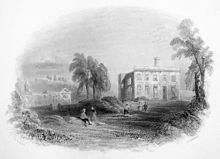Garret Wesley, 1st Earl of Mornington
| Garret, Lord Mornington | |
|---|---|

Dangan Castle, in the County of Meath, c. 1840
|
|
| Born |
19 July 1735 Dangan Castle, in County Meath |
| Died | 22 May 1781 (aged 45) |
| Title | 1st Earl of Mornington |
| Tenure | 1760-1781 |
| Other titles | Viscount Wellesley of Dangan Castle, in the County of Meath |
| Known for | Father of the Duke of Wellington |
| Nationality | Irish |
| Offices |
Member of Parliament for Trim Grandmaster of the Grand Lodge of Ireland |
| Predecessor | Richard Wesley, 1st Baron Mornington |
| Successor | Richard Wellesley, 2nd Earl of Mornington |
| Spouse(s) | Anne Hill-Trevor |
| Parents |
Richard Wesley, 1st Baron Mornington Elizabeth Sale |
Garret Colley Wesley, 1st Earl of Mornington (19 July 1735 – 22 May 1781) was an Anglo-Irish politician and composer, best known today for fathering several distinguished British military commanders and politicians.
Wesley was born at the family estate of Dangan, near Summerhill, a village near Trim in County Meath, Ireland, to Richard Wesley, 1st Baron Mornington, and Elizabeth Sale. He was educated at Trinity College, Dublin, and was elected its first Professor of Music in 1764. From early childhood he showed extraordinary talent on the violin, and soon began composing his own works. As a composer he is remembered chiefly for glees such as "Here in cool grot" (lyrics by William Shenstone) and for a double Anglican chant. It was the future Duke of Wellington who, alone of his children, inherited something of his musical talent.
Wesley represented Trim in the Irish House of Commons from 1757 until 1758, when he succeeded his father as 2nd Baron Mornington. In 1759 he was appointed Custos Rotulorum of Meath and in 1760, in recognition of his musical and philanthropic achievements, he was created Viscount Wellesley, of Dangan Castle in the County of Meath, and Earl of Mornington. He was elected Grandmaster of the Grand Lodge of Ireland in 1776, a post he held until the following year. He was careless with money, and his early death left the family exposed to financial embarrassment, leading ultimately to the decision to sell all their Irish estates.
...
Wikipedia
